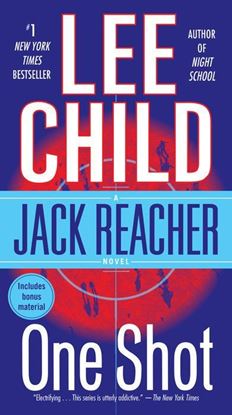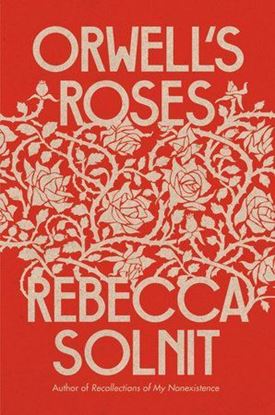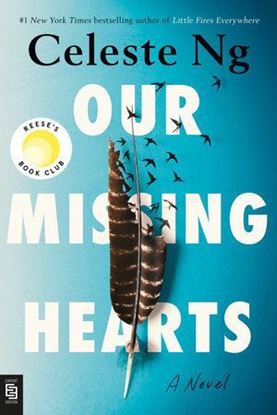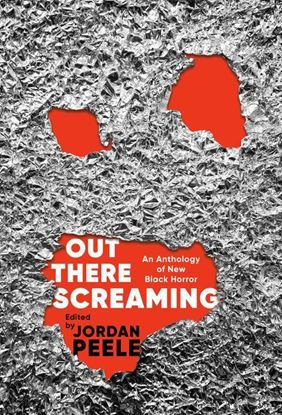

ONE SHOT
Six shots. Five dead. One heartland city thrown into a state of terror. But within hours the cops have it solved: a slam-dunk case. Except for one thing. The accused man says: You got the wrong guy. Then he says: Get Reacher for me.
And sure enough, ex—military investigator Jack Reacher is coming. He knows this shooter–a trained military sniper who never should have missed a shot. Reacher is certain something is not right–and soon the slam-dunk case explodes.
Now Reacher is teamed with a beautiful young defense lawyer, moving closer to the unseen enemy who is pulling the strings. Reacher knows that no two opponents are created equal. This one has come to the heartland from his own kind of hell. And Reacher knows that the only way to take him down is to match his ruthlessness and cunning–and then beat him shot for shot.
450
ORWELL'S ROSES
“In the year 1936 a writer planted roses.” So begins Rebecca Solnit’s new book, a reflection on George Orwell’s passionate gardening and the way that his involvement with plants, particularly flowers, and the natural world illuminates his other commitments as a writer and antifascist, and the intertwined politics of nature and power.
Sparked by her unexpected encounter with the surviving roses he planted in 1936, Solnit’s account of this understudied aspect of Orwell’s life explores his writing and his actions—from going deep into the coal mines of England, fighting in the Spanish Civil War, critiquing Stalin when much of the international left still supported him (and then critiquing that left), to his analysis of the relationship between lies and authoritarianism. Through Solnit’s celebrated ability to draw unexpected connections, readers encounter the photographer Tina Modotti’s roses and her Stalinism, Stalin’s obsession with forcing lemons to grow in impossibly cold conditions, Orwell’s slave-owning ancestors in Jamaica, Jamaica Kincaid’s critique of colonialism and imperialism in the flower garden, and the brutal rose industry in Colombia that supplies the American market. The book draws to a close with a rereading of Nineteen Eighty-Four that completes her portrait of a more hopeful Orwell, as well as a reflection on pleasure, beauty, and joy as acts of resistance.
900
OUR MISSING HEARTS
Twelve-year-old Bird Gardner lives a quiet existence with his loving but broken father, a former linguist who now shelves books in a university library. His mother Margaret, a Chinese American poet, left the family when he was nine years old without a trace. Bird knows to not ask too many questions, stand out too much, or stray too far. For a decade, his family's life has been governed by laws written to preserve “American culture” in the wake of years of economic instability and violence. To keep the peace and restore prosperity, the authorities are now allowed to relocate children of dissidents, especially those of Asian origin, and libraries have been forced to remove books seen as unpatriotic.
Bird has grown up disavowing his mother and her poems; he doesn’t know her work or what happened to her, and he knows he shouldn’t wonder. But when he receives a mysterious letter containing only a cryptic drawing, he is pulled into a quest to find her. His journey will take him back to the many folktales she poured into his head as a child, through the ranks of an underground network of librarians, into the lives of the children who have been taken, and finally to New York City, where a new act of defiance may be the beginning of much-needed change.
750
OUT THERE SCREAMING: AN ANTHOLOGY OF NEW
A cop begins seeing huge, blinking eyes where the headlights of cars should be that tell him who to pull over. Two freedom riders take a bus ride that leaves them stranded on a lonely road in Alabama where several unsettling somethings await them. A young girl dives into the depths of the Earth in search of the demon that killed her parents. These are just a few of the worlds of Out There Screaming, Jordan Peele’s anthology of all-new horror stories by Black writers. Featuring an introduction by Peele and an all-star roster of beloved writers and new voices, Out There Screaming is a master class in horror, and—like his spine-chilling films—its stories prey on everything we think we know about our world . . . and redefine what it means to be afraid.
995
OVERRULED
Danica Pierce has one great love in her life: work. As one of the top divorce lawyers in Austin, Danica lets her caseload keep her warm at night and has no problem being married to her job, not when love only ends in hurt. When the biggest case of her career gives her a shot at making partner, it seems like nothing could possibly stand in her way…except for her infuriating secret: she’s sleeping with the enemy.
Ezra Hart is known for charming his way in and out of a courtroom. In the matter of winning Danica Pierce’s heart, however, he’s been far less successful. With her verdict to keep things purely physical with no chance of appeal, Ezra struggles to show Danica he’s more than the insufferable playboy she’s pegged him to be—especially since they find themselves on opposing sides of Danica’s most important case to date.
While Dani and Ezra battle it out in the courtroom, the real trial is the one happening between them. When Dani realizes that everything she knows of Ezra might be hearsay—and that she’s not the only one with emotional baggage—she must choose between her fear of trusting again and the feelings blossoming between her and the man she thought was her worst enemy.
900
PAPER HEARTS
Felicity has her entire future planned. Ever since her older sister ran away, she's had the full weight of her mother's expectations on her shoulders. So she works hard to get straight As and save for college.
Except sometimes the best things in life are unplanned like when Felicity meets a handsome, masked stranger while she is volunteering at a charity masquerade ball. She never thought he'd flirt with her. And she certainly never thought he'd turn out to be a member of the world-famous Heartbreakers band, Alec.
Then Felicity uncovers a shocking family secret. Suddenly, she, Alec, and her two best friends are off on a road trip to find Felicity's missing sister. And she's about to discover that unexpected turns have a peculiar way of landing her right where she needs to be…
850













